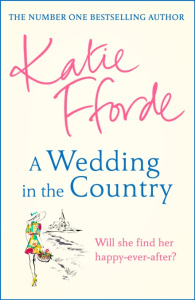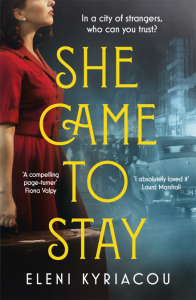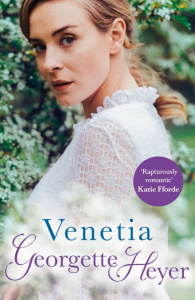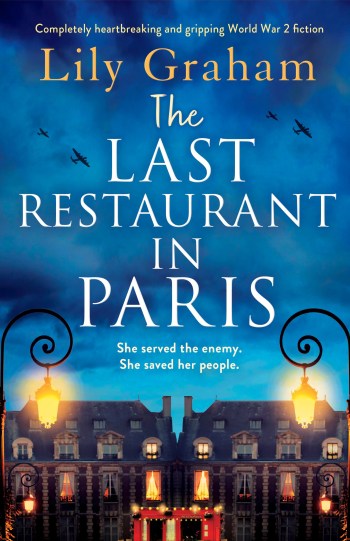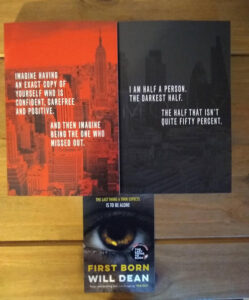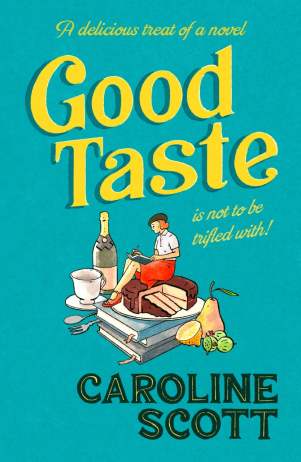Franny was standing behind her, with the dog in her arms.Back in the chill of the empty bed, Malorie couldn’t sleep. The wind had dropped and now she could hear a rustling from above. It was probably the mice again. The old woman in the sampler flickered across her brain. As her mind reached for stillness and quiet, all she could see was the large black dog with the stitched yellow crosses for eyes, like a creature from a nightmare.Franny had a curious smile on her face. ‘She was my age. And she had a dog like Larry too. It’s this house, isn’t it?’‘Bedtime,’ said Malorie with false cheeriness, and took her upstairs. Larry padded up close behind them. The ceilings were low there too, and the landing seemed to curl upwards. The walls on the landing were panelled in dark wood, like the ground floor, but here it went all the way up to the ceiling, which made it feel like being in an upturned boat.‘This is my room,’ said Franny, ‘I already found it.’It’s my stop on the blog tour for The Marsh House by Zoë Somerville. I’m sharing my thoughts about the book and I also have an extract from chapter 3 for you to read. My thanks to Kathryn Colwell of Head of Zeus for the place on the tour and the review copy of the book.If you’re in the part of the country where this book is set then Waterstones Norwich (Castle St) will be hosting ‘An evening with Polly Crosby and Zoë Somerville’ on Wednesday 23rd March 2022 at 7pm.
‘Not tomorrow. Sunday. Or Monday. Soon.’ It was only two days before but she could hardly remember what had been said. She’d snatched at his arm but he’d pushed past her. I need to go. Go then. And he had. Gone to her, the girl at the club. She wondered how old she was, whether she was the age Malorie had been when she’d met him, a young body unmarked by childbirth. He hadn’t come back and she’d lied to Franny, told her he was working.
Where would it be? Under a doormat? There wasn’t one.
‘Where’s the sea?’ whined Franny. ‘You said it was the seaside.’
‘I’m hungry,’ said Franny, standing in the kitchen doorway, still holding the dog, whose muzzle was buried in her duffle coat.
I found this to be a very atmospheric book, not least because of the setting, both the wider surroundings of the marsh itself and the isolated Marsh House with only another cottage close to it. I had a strong sense of shady figures emerging from the mists and sinister happenings. I’m not really one for a ghost story but the ghostly element here is done well and will give you the creeps if you’re so inclined.
‘Tomorrow?’
Malorie finds journals left by one of the previous residents of the house in the 1930s and she becomes embroiled in and entranced by Rosemary’s narrative. Gradually the two stories become intertwined.
A few years ago, when she was diagnosed with ‘nerve strain’, the doctor had assumed it was her father’s death that had been the catalyst but it went back further than that. She simply did not have the gift of happiness. She was afraid that if she started taking them again, she’d never stop. She was too tired to move from the kitchen, too tired for anything, and after three glasses of the sickly sherry, she was even too tired to drink. Maybe she’d be able to sleep tonight after the long drive.
‘Mummy? What are you doing?’
‘Yes, it must be,’ said Malorie, relieved at least that Franny seemed happier.
Today was what? The twenty-first. Midwinter. Tomorrow was Saturday. All the shops would be shut on Sunday and then it was Christmas Eve. She couldn’t bear the thought of attempting anything then. And if Tony did come and there was nothing, the turn in his mouth would be another failure. They would have to go tomorrow.
At the bottom, Malorie read aloud, ‘Worked by Rosemary Wright, aged eight.’
The Marsh House is a very good read, one for those who enjoy a suspenseful story with a hint of the witchy thrown in.
Franny didn’t complain about brushing her teeth or her long hair. She took the pill for her nerves without complaint, and went to bed clutching her teddy bear, Frederick, quite compliant. She had Malorie’s colouring: wan with dark hair that looked copper when the light caught it. People always commented on the two of them together – ‘Oh, she’s a spit,’ and so on. But it wasn’t really true, it was just the hair that tricked people, and the winter-sallow skin which turned a muddy brown in the summer. In reality, Malorie had sludgy-grey eyes and small features in a round face that made her look childish, and her hair was dull and dead straight. She had it backcombed up and pinned on the top, but it was hard to do anything with it. People always thought she was younger than she was, but her daughter looked older than her years. Franny’s eyes were green and searching and there was a frown-crease between her eyebrows that Malorie wished she could wipe away.
Franny looked like she would cry. She had grey circles under her eyes. Her daughter had nightmares, and rarely slept through a night.
Chapter 3 – The Sampler
The Marsh House by Zoe Somerville, published by Head of Zeus [Apollo Fiction], is out now in hardback.
Malorie sent her to explore and busied herself lighting the gas oven (she found matches in a drawer and thanked God – or was it the agency? – again) and putting the kettle on the hob. On a shelf above the oven were dusty brown bottles, like the ones you’d find in a chemist’s. The liquid inside one was dark and treacly. She picked it up and opened the stopper but it smelt rancid and she quickly put the stopper back in. There was no toaster but she’d brought some sliced bread and she could toast it under the grill. She could cope. But there was no milk and no butter and for a moment, she felt herself waver and rock in the middle of the cold floor.
‘And Mummy,’ said Franny, ‘when’s Daddy coming?’
I liked how the dual timeline stories came together with themes of motherhood and isolation running through both, and I thought the author plotted her storylines very effectively. The reader is able to read Rosemary’s notebooks along with Malorie and then watch from the sidelines as she processes them and deals with her difficult Christmas in Norfolk. I thought both elements were strong and I was able to fully immerse myself in each.
That night she was woken from a dream where the figures in the picture were alive and their faces changed into hers and Franny’s. She and Franny walked in the dream down to the marsh.
The back of her neck tingled. There was something – just out of her hearing – that she couldn’t quite place. She held herself still and closed her eyes; strained all her other senses. Nothing. It was deathly quiet, that was all. She was so unused to the country, it was unnerving. If she concentrated very hard she could just hear the creaks of the walls as they shifted and settled and a faint wind breathing in and out of the chimneys. Then a scratch; a thin, scratching sound coming from above. Mice.
It was a child’s room with dusky pink wallpaper and a single bed with a pink-sprigged bedspread. The tiny, low window overlooked the lane.
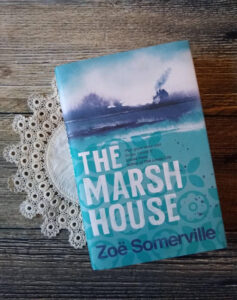
‘I need to find the key.’
She thought of her fair, plump father and it seemed a stretch to think these people were any relation of his. But she tried to tamp down the initial disappointment. The connection to the house could be anything. He could have worked here, he could have been a friend. There had to be something.
In the bedroom at the back of the house, Malorie rubbed her feet together in the lumpy cold bed and tried to dig into the scratchy sheets to gain some warmth. There was another, larger room – she’d opened the door to see – but decorating cloths covered the furniture and what light there was didn’t seem to penetrate it. It felt more like a funeral parlour than a bedroom so she’d taken this east-facing one instead. Eventually she gave up trying to warm her frozen feet and found a pair of socks to wear and a heavy wool blanket to cover herself with. It was not so bad. They were here. They’d made it. If they could have this one thing, a family Christmas, it would be all right. It would be different in the morning. Tomorrow would be better.
A gull cawed and woke her. Her feet were cold again. The curtains were white and thin and the shimmer of the moon gave them a glassy sheen. There was a noise in the dark, like a child crying. It must be the gulls in the dream; she was still half asleep. There it was again. The window banged against its frame. It was the wind. She closed her eyes, tried to sink back into sleep, but the sound came again and then she was awake, sat upright. It must be Franny. Clutching her dressing gown tight around her, she crept out. On the landing, she paused: the crying had stopped. But she should check anyway. She opened the door and stepped in. The moonlight was stronger in here and gave a surreal quality to the room, like a room in a painting of a dream. Franny and Larry were both asleep but her daughter was twisting in the bed, moaning. This was what she must have heard. As she turned to go, her eyes were drawn to the strange sampler above the bed. It was half-lit by the moonlight. A cloud must have passed over the moon because a shadow crossed the cloth and the figures almost appeared to move. Then the moon was blocked again and the room was returned to shadow. She shivered and rubbed her eyes.
Zoë Somerville is originally from Norfolk, but has settled with her husband and children in the West Country. She works as an English teacher. Zoë began her debut novel, The Night of the Flood on the Bath Spa Creative Writing MA in 2016. It was published in September 2020. Her second novel, The Marsh House, a ghost story and mystery is published in March 2022. She is currently writing her third novel.
‘It’s nearby,’ she said.
Larry was curled up in a ball of cream fur at the end of the narrow bed. At least Franny had the dog for company, and for warmth.
On her own in the kitchen she opened a bottle of sherry she’d brought for Christmas, poured herself a glass then sat, huddled in the fur coat Tony had bought her, drinking the sherry and chain-smoking the last of her Rothmans. The small window reflected the kitchen lamplight back at her. Beyond it was darkness, the emptiness of the countryside, only the house between her daughter and all that lay beyond. The vastness of the unknown – her isolation – she felt as something physical, a great crushing embrace of darkness, and she had to rest her head on the table. She imagined reaching into her handbag for the Luminal the doctor had prescribed, swallowing one down with a draught of sherry. The ease of it, the relief. But she’d forced herself to stop all that. She’d begun reaching for them too much, needing them, sinking back down into the stupor she’d been in when Franny was small.
There were no lights. It was a dark presence. Malorie had a sudden, crushing sense that she’d made a mistake. The house’s many small eyes – she counted eight windows at the front at least – were blinded and in the gloom, the flint and brick face dull and forbidding. It was the time of day, perhaps. A jutting-out porch, concealing the front door, gaped dark like an open mouth. She switched off the engine and nightfall came rushing in. A dog was barking madly from across the lane somewhere. The back of her neck prickled as though she were being watched, and she turned to see who it was. She thought something moved in the trees across the lane. Grabbing her coat, she got out of the car to look, but the trees gave nothing away.
‘Mummy, if we’re having Christmas here, we need decorations and a tree.’
Next to the door was an old terracotta pot. It would be there. It was – a rusty old key underneath the damp pot. Her shoulders relaxed. It was going to be all right.
Their supper was two mugs of black tea and toast with jam but no butter, and there was no coal to make a fire so it was freezing too. Franny made a face at the cup of tea and left it, but she ate the toast, feeding the crusts to the dog who sat begging by her chair.
The door was a heavy wooden one, with a small grubby window and a tarnished knocker in the shape of an anchor, which gleamed dully in the dying light. The long key stuck slightly in the lock and for a horrible moment she thought it wouldn’t turn. The fluttering of panic came again but she made herself breathe out. She tried again. It turned and clicked and the door swung open. It was not much warmer inside. A smell of dust and age wafted over her. There was electricity though, thank God. She flicked the switch and the pale glow of the old-fashioned brass sconces flickered and shone on the worn carpet, low panelling and flowery wallpaper. On a dark-wood side table with ornate legs was an upright telephone with a separate earpiece – like something from an antiques shop. At least they’d entered the twentieth century. But further inspection revealed that the house had got stuck some years before. The ceilings were low and beamed and the wallpaper, densely covered in a pattern of twisting vines with little yellow flowers and green leaves, was peeling at the edges. From the walls came the musty smell of lack of use and damp, and Malorie wondered when the windows had last been opened. She made her way through to the kitchen at the back of the house. It contained ancient cupboards, an old gas range and a cracked butler sink under a small window. The clouded pane looked out onto a long garden and Malorie could tell, even in the gloom, that the marsh was just there, beyond a low wall at the end. Tomorrow, they would go to the marsh. They would walk along the paths by the creeks and see the sleek heads of seals.
‘Look at this,’ she said, and pointed above the bed. Nailed to the wall was a yellowing sampler, depicting a house with the tufts of marram grass behind and the sea beyond. It was the house they were in, the Marsh House, beautifully stitched in grey for the flint and red for the bricks. Malorie craned to get a closer look and drew in her breath. In front of the house was an image of a strange woman, standing beside a large wolf-like dog with yellow eyes. And next to her was a young girl with long black plaits and tiny green crosses for eyes, holding a small chestnut-brown dog in her arms. On the other side of the house, a short, dark-haired woman with her mouth turned down. At the top, a motto was stitched in red thread: May I strive for innocence and truth my every action guide. And guard my inexperienced youth from arrogance & pride.‘Soon,’ she said.

